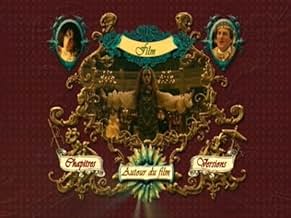AVALIAÇÃO DA IMDb
6,9/10
2,5 mil
SUA AVALIAÇÃO
Jean-Batiste Lully foi um compositor genial com uma paixão pela dança que encontrou em Luís XIV o patrono a quem devotou lealdade. Esta é a história do compositor, dos seus rivais, amigos e ... Ler tudoJean-Batiste Lully foi um compositor genial com uma paixão pela dança que encontrou em Luís XIV o patrono a quem devotou lealdade. Esta é a história do compositor, dos seus rivais, amigos e da sua relação com o rei mais famoso de França.Jean-Batiste Lully foi um compositor genial com uma paixão pela dança que encontrou em Luís XIV o patrono a quem devotou lealdade. Esta é a história do compositor, dos seus rivais, amigos e da sua relação com o rei mais famoso de França.
- Direção
- Roteiristas
- Artistas
- Prêmios
- 1 vitória e 5 indicações no total
Idwig Stéphane
- Prince de Conti
- (as Idwig Stephane)
Avaliações em destaque
Another reviewer was mistaken when he wrote, "In order to understand the movie, one has to be quite familiar with French history ...." While it wouldn't hurt to know everybody's back story, it is NOT essential to appreciating this movie. Before I watched it, I had never heard of Lully or Cambert or Anne of Austria; I had heard of Molière and Conti but knew nothing about them except their names; but I had no trouble at all following the movie and enjoying it as much as I could with its substantial flaws.
The same reviewer complained that the actors playing Molière, Conti and Cambert were much too old, that all three were closer to Louis' age. What bothered me more than the wrong ages of some of the supporting characters was the fabulous gorgeousness of the actors who played Louis and Lully. Please! There are good portraits of both men, and both of them were as homely as my aunt Gertrude - especially Louis.
That a man who looked like a gargoyle dwarf (he was only a few inches over five feet tall), saddled at the age of four with a bankrupt, strife-torn, second-rate country, transformed himself into the Sun King and his country into a major world power, and by the force of his will completely dominated Western civilization for nearly a century - and STILL, more than 300 years later, and despite the horrific revolution that destroyed the world he created, is the single most significant person in the history of France (only Napoleon comes close, and he was a flash in the pan compared to Louis) - is a big part of what makes him so extraordinary. If he had looked like Benoît Magimel, what would be the big deal? Gorgeous people automatically control the world; they don't have to DO anything. Louis is fascinating because he was NOT gorgeous, and making him gorgeous wipes out 75% of what makes him interesting.
The answer to both that reviewer's and my beefs with this movie is that its makers had no intention of making an historically accurate quasi-documentary about this fascinating man and the almost equally fascinating people around him. They intended to make an overblown, potboiler soap opera based loosely on real people. They made the principals gorgeous because who cares what happens to ugly people? They made the villains grotesque and old because if they had been young we might not have known they were the villains.
This is a French movie, but it might as well have been made in Hollywood. It is cheap (and I'm not talking about money) melodrama, with gorgeous, dashing heroes and old, ugly, hunched-over, troll-like villains with grotesque birthmarks on their faces. It was NOT made for experts in French history or any other persons of intelligence and discernment.
It was made for an audience that neither knows nor cares how accurate it is or who the people in it are. That's how Hollywood does everything, by formula - the same formula they used in silent westerns, where you knew the good from the bad guys by the color of their hats - so audiences don't have to think, don't have to understand anything. They know by their looks which characters to cheer and which ones to boo, and that's all that matters.
The same reviewer complained that the actors playing Molière, Conti and Cambert were much too old, that all three were closer to Louis' age. What bothered me more than the wrong ages of some of the supporting characters was the fabulous gorgeousness of the actors who played Louis and Lully. Please! There are good portraits of both men, and both of them were as homely as my aunt Gertrude - especially Louis.
That a man who looked like a gargoyle dwarf (he was only a few inches over five feet tall), saddled at the age of four with a bankrupt, strife-torn, second-rate country, transformed himself into the Sun King and his country into a major world power, and by the force of his will completely dominated Western civilization for nearly a century - and STILL, more than 300 years later, and despite the horrific revolution that destroyed the world he created, is the single most significant person in the history of France (only Napoleon comes close, and he was a flash in the pan compared to Louis) - is a big part of what makes him so extraordinary. If he had looked like Benoît Magimel, what would be the big deal? Gorgeous people automatically control the world; they don't have to DO anything. Louis is fascinating because he was NOT gorgeous, and making him gorgeous wipes out 75% of what makes him interesting.
The answer to both that reviewer's and my beefs with this movie is that its makers had no intention of making an historically accurate quasi-documentary about this fascinating man and the almost equally fascinating people around him. They intended to make an overblown, potboiler soap opera based loosely on real people. They made the principals gorgeous because who cares what happens to ugly people? They made the villains grotesque and old because if they had been young we might not have known they were the villains.
This is a French movie, but it might as well have been made in Hollywood. It is cheap (and I'm not talking about money) melodrama, with gorgeous, dashing heroes and old, ugly, hunched-over, troll-like villains with grotesque birthmarks on their faces. It was NOT made for experts in French history or any other persons of intelligence and discernment.
It was made for an audience that neither knows nor cares how accurate it is or who the people in it are. That's how Hollywood does everything, by formula - the same formula they used in silent westerns, where you knew the good from the bad guys by the color of their hats - so audiences don't have to think, don't have to understand anything. They know by their looks which characters to cheer and which ones to boo, and that's all that matters.
I just saw the movie during a French art and culture festival in Hong Kong. It was the answer to my quest for a movie that deals with the subject of King Louis XIV's passion for dance and that of Lully's influence in the king's life. (I had previously seen half a dozen movies dealing with the subject of Louis XIV but NONE even touched on the fact that he loved dancing.) I was thrilled by what I saw, especially "Le Ballet de la Nuit" performance in which the 14-year-old king was dressed in the fashion of Apollo and danced a majestic dance. I am surprised none of the comments mentioned anything about the choreography.
I had the fortune of meeting the choreographer of the film, Béatrice Massin, who attended the screening. She is THE authority of Baroque dance in France, after having worked with Francine Lancelot, who was the pioneer in the restoration of Baroque dance into its original form. Massin works with original dance notation materials from Louis XIV's time, especially the Feuillet notations, which provided very detailed and exact instructions on the dance steps used at Louis XIV's court. This dance form is very important because it is the origin of today's ballet, which has gone through a lot of transformations, especially from that of a male-only art form to one where the female dancer dominates the stage.
During production, Massin worked with the lead roles in the movie every day for three months, and she has high regard for Benoît Magimel. Though not a professional dancer, he attempted all the dance sequences with courage, never uttering the words "I can't." Of course, the repertoire of Baroque dance was wide-ranging and Massin could not possibly have included all the varieties of that era. She mainly worked in such a way to show what the director wanted. In the context of this movie, the director had wanted to show the masculine power that the king wanted to demonstrate, as a way to consolidate his power on the throne. So what we see in the movie comes across as very forceful, masculine movements.
One thing that the film has left out - what Massin feels as a mistake - is the character of Pierre Beauchamps. Beauchamps was the key dance master at Louis XIV's court and was responsible for dance education and choreographer, although he was also a musician - not as accomplished as Lully at that, while Lully's dancing skills would pale alongside Beauchamps'. In fact, Lully, Beauchamps and Molière were working very closely together. For me, it is a big, big regret that this movie, whose theme is Louis XIV's passion and talent for dance, has treated Beauchamps in such a dismissive manner (the only scene where he appeared was when the king asked him to leave the room and rearrange the choreography, to give it "more air!").
Another thing that I miss seeing is the establishment of l'Académie Royale de la Dance. Surely, the film shows that the king announced it in a royal decree as soon as he took over all the power upon Mazarin's death. But it would have been nice to see a snippet of the academy's activities, such as how the first group of professional ballet dancers were trained.
Unlike what some of the commentators here have said, though, I think that the film does have a deep aspect. The idea that Louis XIV cared so much about the art of dance and music and Lully's concept of music being something to make the king immortal -- points to the transcending nature of these arts. Although dance and music was used as much as a political tool for power as a form of entertainment at the court, I personally feel that the passion for dance and music - as a pure form of truth and beauty - is powerfully expressed through the dramatic performances of the actors and actresses in this film.
Anybody who loves the subject of Louis XIV, Baroque music, dance and ballet should go and see this film.
I had the fortune of meeting the choreographer of the film, Béatrice Massin, who attended the screening. She is THE authority of Baroque dance in France, after having worked with Francine Lancelot, who was the pioneer in the restoration of Baroque dance into its original form. Massin works with original dance notation materials from Louis XIV's time, especially the Feuillet notations, which provided very detailed and exact instructions on the dance steps used at Louis XIV's court. This dance form is very important because it is the origin of today's ballet, which has gone through a lot of transformations, especially from that of a male-only art form to one where the female dancer dominates the stage.
During production, Massin worked with the lead roles in the movie every day for three months, and she has high regard for Benoît Magimel. Though not a professional dancer, he attempted all the dance sequences with courage, never uttering the words "I can't." Of course, the repertoire of Baroque dance was wide-ranging and Massin could not possibly have included all the varieties of that era. She mainly worked in such a way to show what the director wanted. In the context of this movie, the director had wanted to show the masculine power that the king wanted to demonstrate, as a way to consolidate his power on the throne. So what we see in the movie comes across as very forceful, masculine movements.
One thing that the film has left out - what Massin feels as a mistake - is the character of Pierre Beauchamps. Beauchamps was the key dance master at Louis XIV's court and was responsible for dance education and choreographer, although he was also a musician - not as accomplished as Lully at that, while Lully's dancing skills would pale alongside Beauchamps'. In fact, Lully, Beauchamps and Molière were working very closely together. For me, it is a big, big regret that this movie, whose theme is Louis XIV's passion and talent for dance, has treated Beauchamps in such a dismissive manner (the only scene where he appeared was when the king asked him to leave the room and rearrange the choreography, to give it "more air!").
Another thing that I miss seeing is the establishment of l'Académie Royale de la Dance. Surely, the film shows that the king announced it in a royal decree as soon as he took over all the power upon Mazarin's death. But it would have been nice to see a snippet of the academy's activities, such as how the first group of professional ballet dancers were trained.
Unlike what some of the commentators here have said, though, I think that the film does have a deep aspect. The idea that Louis XIV cared so much about the art of dance and music and Lully's concept of music being something to make the king immortal -- points to the transcending nature of these arts. Although dance and music was used as much as a political tool for power as a form of entertainment at the court, I personally feel that the passion for dance and music - as a pure form of truth and beauty - is powerfully expressed through the dramatic performances of the actors and actresses in this film.
Anybody who loves the subject of Louis XIV, Baroque music, dance and ballet should go and see this film.
10mcv-3
le roi danse feels like a french response to the excellent film "amadeus." a beautiful costume film with sumptuous scenes of dance and song, it takes its liberties with historical accuracy. we never get too deep into the characters louis xiv, lully or moliere, but with hints of obsessions (homosexual or otherwise) here and there, we understand them all well enough. if you're looking for something entertaining this film will undoubtedly please, though it won't make you think too hard. many of the reactions viewers have are probably quite visceral -- though the film talks about the loftiness of dance, it deals with the most basic of human motivations and feelings, of jealousy, lust, desire, horror even. there are a few wince-worthy moments (not for the squeamish), two specifically seem to book-end the film. they're not explicit, just painful, so the squeamish should be okay once these moments pass. le roi danse is not a terribly deep movie, but there's enough there to feel compelled by the characters, thus this is still compelling and astoundingly beautiful. on top of the great visuals and direction, excellent acting by magimel, terral and karyo all.
Having just seen this film I was impressed and intrigued enough to want to comment on it.The subject is quite unusual-the life,rise and court of the famous French king Louis the fourteenth,the famous "sun king" as seen by his court musician,the not least famous Lully. The style,imagery,artistic means of this film reminded me of another much talked about film which also deals with a composer,Forman's Amadeus-in both films we see certain taste for the dramatic, even overtly theatrical,for haunting and often violent scenes,for the grotesque and almost disturbing. However I prefer a more disturbing,uncomfortable view of history than the typical Hollywood style of idealizing historical characters whether if actually good,bad or just complex(a mixture of good and bad,like most historical characters and most people really are). The film is historically somewhat biased,mainly for two reasons: 1.though an important part of Louis's reign,Lully's music wasn't the most important affair of state,yet in this film it is depicted as if it were the only reason of existence for France,the king,s family,his court 2.Lully and Moliere weren't the only artists to contribute to the glamor,luxury,power,glory,cultural achievements and distinctive style always linked with the sun-king's reign-there were also architects like Le Brun,Le Vau,Le Notre,tragedy-play writes like Corneille and Racine,literary critics like Boileau,carpenters like Boulle and many other,among whom even the tens of thousands of laborers,who died or became ill while turning,with immense efforts and during decades of relentless work,the inhospitable marshes of Versailles into Europe's most famous and glamorous royal residence... The sun-king is depicted in an awkward,somewhat strange way:the immense opulence of his lifestyle is known,however I always pictured him much more formal and reserved,almost arrogant,distant in his majestic dignity,exhaling a spartan sobriety and god-like greatness out of every pore. Without being a parody or caricature of the real Louis,I often got quite the opposite of what I expected-he seems to me vulnerable,lonely,often unloved and misunderstood,unbalanced,craving for appreciation and success(historically,these attitudes can be partly explained by the fact that Louis was at the beginning of his reign,before he gradually became an absolute ruler). And Louis dances...Russel's The Devils seems to anticipate this film,as we see that also Louis the thirteenth,none else than the sun king's father is also depicted as a music-lover,an innate artist rather than a monarch(remember Russel's creation and how the French king from that film was depicted wearing almost the same elaborate costumes and performing almost the same histrionic,yet fascinating dance movements),however Russel's intention was to detract French monarchy as decadent,capitalizing on the homophobic reactions the king's slightly effeminate clothing and gesture might cause,especially to the more conservative viewer. A certain homo-erotic message is undoubtedly present,however not in order to deconstruct the myth of the sun-king,it is often hinted how hard it is for Lully,who anxiously tried to closet his bisexual desires and fit into the heterosexual mainstream,to keep his secret love for the king hidden well,even if strictly heterosexual in his private life it is a historical fact that Louis the fourteenth is known to have been an extremely good-looking man and therefore likely to attract admirers of both genders-I think the actor playing Louis is a good choice as he both resembles the historical character and is handsome enough to justify Lully's crush,however a profssional dancer would have also depicted truthfully Louis the showman rather than the politician(or a politician trough his on-stage extravaganza,as an expression of power and a manipulatuive technique),this very side of the king's personality would have been the ideal part,even more than for Magimel or Tarding for brilliant real-life performers Nurejew or Baryshnikow.Another historical character with whom the sun king might be compared is the Emperor Nero-he too build an impressive,megalomaniac palace as symbol of his absolute,almost divine power(Versailles being a baroque version of the legendary Domus Aurea-The House of Gold),both being fascinated of overindulgent self-marketing by comparing themselves to particularly grand and lavish imagery like the sun,the sun-god,gold and the golden age,both of them being known not only as protectors of art but also as performance-Nero scandalized the virtuous Romans with his acting and his often effeminate costumes and parts,just like young Louis shocked the Catholic circle gathered around his aging and strict mother and some exaggeratedly pious and narrow-minded aristocrats,which rather than understanding the beauty of art played the strict moralists(though often immoral themselves). In the end,as we also know from history,the sun-king succeeds to fulfill his dreams of magnificence,however at a high cost,among the ones who payed the price being eventually the court composer himself:Lully got injured while stubbornly insisting to conduct a Te Deum which his monarch didn't even honor with his presence,this injury getting infected and causing Lully's death(this is historical fact,Lully really died this way),the whole film being,like in Amadeus,a deathbed confession recalling the most important moments in the composer's life. Even if Lully's death appears as accidental,useless and stupid,it gave his life the ultimate meaning and apotheosis-by refusing to accept the amputation of the wounded body-part he ultimately sacrificed his life to his sovereign,being the perfect subject,faithful to his master till the end,giving both his work and his love for the king a noble and uplifting conclusion,defying&defeating all the rumors and irony spread by his many rivals.
Just arrived home from a jump into the 17th century at the royal court of Louis XIV. This film gives you an excellent inside look of one of the most protectors of the arts. You may find the story a bit thin, but the images are very carefully chosen and composed. It's not an ordinary costume show and happily made under the supervision of culture historians. Maybe the music does sound a bit the same during the film, but it also let you hear some magnificent moments. I enjoyed this movie very well because of the richness of the photography and the well balanced cast. I recommand this film to those who love western culture during one of the highest levels, the baroque.
Você sabia?
- CuriosidadesThe small violin Lully plays when conducting the orchestra is called a 'pochette', so called because it could be carried in a coat pocket.
- ConexõesFeatured in L'aventure humaine: La véritable histoire de d'Artagnan (2021)
- Trilhas sonorasTe Deums: Symphonie
Written by Jean-Baptiste Lully
Conducted by Reinhard Goebel
Performed by Musica Antiqua Köln
Principais escolhas
Faça login para avaliar e ver a lista de recomendações personalizadas
- How long is The King Is Dancing?Fornecido pela Alexa
Detalhes
- Data de lançamento
- Países de origem
- Centrais de atendimento oficiais
- Idioma
- Também conhecido como
- The King Is Dancing
- Locações de filme
- Empresas de produção
- Consulte mais créditos da empresa na IMDbPro
Bilheteria
- Orçamento
- US$ 21.000.000 (estimativa)
- Faturamento bruto mundial
- US$ 3.203
- Tempo de duração
- 1 h 55 min(115 min)
- Cor
- Mixagem de som
- Proporção
- 2.35 : 1
Contribua para esta página
Sugerir uma alteração ou adicionar conteúdo ausente




























